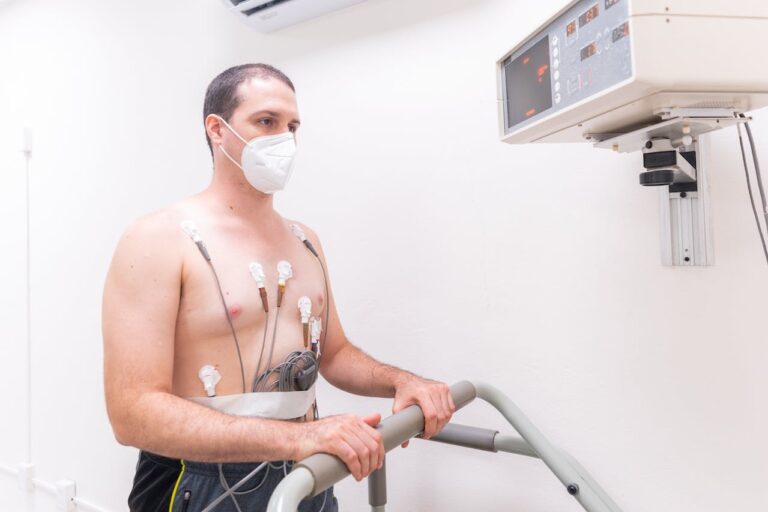Services
Stress Echo
- During peak exercise, your doctor uses ultrasound to check if your heart receives adequate blood and oxygen.
DIAGNOSTIC TESTS

A stress echocardiogram, also known as an echocardiogram stress test, evaluates heart and blood vessel function.
During the procedure, you’ll engage in physical activity while your doctor monitors blood pressure and heart rhythm.
At peak exertion, ultrasound images are taken to assess if your heart muscles receive sufficient oxygen during exercise.
This test is ordered for chest pain suspected to be from coronary artery disease or a heart attack. It also gauges exercise tolerance for cardiac rehabilitation.
Additionally, the test assesses the effectiveness of treatments like bypass grafting, angioplasty, and medications.
There are several uses for ultrasound, such as:
- Cardiac Function Evaluation: A stress echocardiogram assesses the function of the heart and blood vessels during physical exertion.
- Dynamic Imaging: Ultrasound images are taken at peak exercise to evaluate how well the heart muscles receive blood and oxygen.
- Exercise Component: Patients typically exercise on a treadmill or stationary bike during the test to simulate physical stress.
- Blood Pressure and Heart Rhythm Monitoring: Throughout the procedure, the doctor monitors blood pressure and heart rhythm to gauge cardiovascular responses.
- Detection of Coronary Artery Disease: The test is useful in diagnosing coronary artery disease, especially in cases where chest pain is suspected.
- Identification of Heart Attack Risk: It helps assess the risk of a myocardial infarction (heart attack) by evaluating blood flow to the heart during stress.
Guidance for Cardiac Rehabilitation: The test determines how much exercise a patient can safely tolerate, providing guidance for cardiac rehabilitation programs.
Effectiveness of Treatments: It evaluates the efficacy of interventions such as bypass grafting, angioplasty, and medications like anti-anginal or antiarrhythmic drugs.
- Clinical Decision-Making: Results from a stress echocardiogram assist doctors in making informed decisions about the patient’s cardiac health and treatment options.
- Comprehensive Cardiovascular Assessment: The test offers a comprehensive evaluation of the cardiovascular system’s response to stress, aiding in the understanding of overall heart function.
PRIOR TO THE STRESS ECHO
A stress echocardiogram, also known as an echocardiography stress test or stress echo, is a diagnostic procedure designed to assess the heart’s performance and vascular function under conditions of physical stress. This comprehensive test involves dynamic imaging using ultrasound technology to provide detailed insights into cardiac health.
During a stress echocardiogram, the patient undergoes controlled physical exertion, typically on a treadmill or stationary bike, to simulate the stress the heart experiences during exercise. Throughout the procedure, continuous monitoring of blood pressure and heart rhythm is conducted to evaluate cardiovascular responses.
The key component of the test is the ultrasound imaging, or echocardiography, which captures real-time images of the heart at different stages—both at rest and during peak exertion. This allows for a dynamic assessment of cardiac function, revealing how well the heart muscles are receiving blood and oxygen during periods of increased activity.
One of the primary purposes of a stress echocardiogram is the detection of coronary artery disease, especially in cases where there are concerns about reduced blood flow to the heart muscles. Additionally, the test assesses the risk of a myocardial infarction (heart attack) by evaluating the heart’s ability to handle stress.
Beyond its diagnostic role, a stress echocardiogram provides guidance for cardiac rehabilitation programs by determining the patient’s exercise tolerance. The test also evaluates the effectiveness of interventions such as bypass grafting, angioplasty, and medications like anti-anginal or antiarrhythmic drugs.
Ultimately, the findings from a stress echocardiogram contribute to informed clinical decision-making, helping healthcare professionals tailor treatment plans and manage the patient’s cardiac health effectively. This comprehensive assessment of the cardiovascular system’s response to stress makes the stress echocardiogram a valuable tool in cardiology for diagnosing and managing various cardiac conditions.
